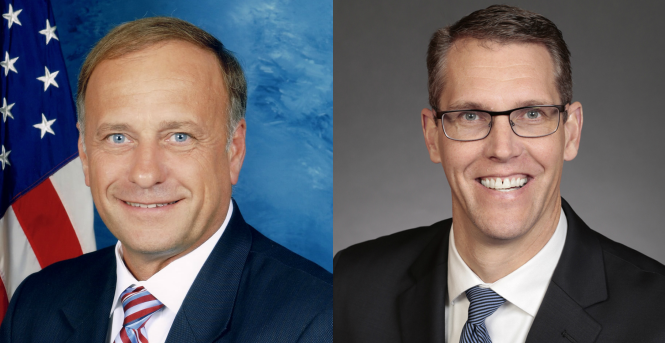Most long-serving members of Congress raise lots of money. Most vulnerable Congressional incumbents raise lots of money.
Then there’s U.S. Representative Steve King.
King’s never been a strong fundraiser, other than during the 2012 cycle, when he faced former Iowa First Lady Christie Vilsack in a substantially redrawn district. Most years, King’s campaign coasts along, raising enough to keep his son and daughter-in-law employed full-time but nothing like the war chests of most entrenched incumbents.
That approach was understandable when King occupied what was thought to be a safe Republican district. But he barely won a ninth term in 2018, and is facing more opposition from within the GOP establishment than ever before.
King’s first-quarter fundraising numbers were weak: his campaign brought in just $61,666.52 in total contributions. His latest Federal Election Commission quarterly, covering contributions and expenditures from April through June, showed a little more money coming in and a lot more going out. King raised $91,421.00, all from individuals, and spent $91,555.72, leaving just $18,385.34 cash on hand as of June 30.
That 100 percent burn rate is remarkable, considering that the town halls King has held around the fourth Congressional district this year are all paid for by his Congressional office–not the campaign. Through June 30, King had held town halls in nineteen counties; by the end of this week, he will have covered 23 of the 39 counties.
As usual, the biggest expenditures for King’s campaign during the second quarter were wages for his son and daughter-in-law. But he also spent more than $25,000 related to direct mail and at least $10,000 to raise money online. He’s not getting his money’s worth for the fundraising expenditures. If any Bleeding Heartland readers have copies of King’s mailings, which are presumably aimed at reliable GOP primary voters, I’d like to see photos or scanned copies. (I would redact names and other identifying information before publishing.)
King’s 2018 Democratic challenger J.D. Scholten hasn’t ruled out running for Congress again. These numbers should encourage him. He raised more than $3 million last cycle. Most of what King and other GOP candidates raise in the coming year will be spent before the June 2020 primary.
Speaking of which, I expected bigger numbers from King’s best-funded Republican opponent, State Senator Randy Feenstra. A lot of Iowa GOP heavy hitters are backing him, and he doesn’t seem to be keeping busy with public events around the district. So I assumed Feenstra was focused heavily on fundraising this quarter. He raised $140,451.00 from April through June, which isn’t bad for a challenger, but it’s quite a bit lower than the $260,000 he raised during the first quarter.
Remember, Feenstra’s past donors include former Governor Terry Branstad, power-broker Doug Gross, Iowa Senate President Charles Schneider, former senior Iowa Senate GOP staffer Ed Failor, Jr, and David Kochel, a leading consultant and strategist for Governor Kim Reynolds and U.S. Senator Joni Ernst. With those kind of connections, Feenstra should have brought in a ton of money.
Feenstra’s $125,351 in contributions from individuals from April through June included $12,126 gifts of less than $200 (which were not itemized). Quite a few well-known Republicans were among the itemized donors giving $113,225 during the second quarter. Bruce Rastetter, Eric Peterson (who works for Rastetter’s Summit Ag Group), Jim Cownie, Patty Cownie, Denny Elwell, and Candy Elwell were among those who maxed out for the primary with $2,800 gifts to Feenstra’s campaign. Kurt and Lynnette Rasmussen each gave $5,600; Feenstra will only be able to use half of their donations before the 2020 primary. Nick Ryan, a longtime Republican critic of King, gave $2,700, and Brent Rastetter (brother of Bruce) gave $2,500. Those who gave $1,000 or more to the campaign this quarter included Jeff Boeyink (a former campaign manager and chief of staff for Branstad), Chuck Larson (Boeyink’s partner in the LS2 lobbying group), and influential Ames business owner Roger Underwood. Six corporate PACs chipped in a total of $12,500, and Feenstra gave his own campaign $2,600.
In addition to out-raising King for the second straight quarter, Feenstra spent less than the incumbent: $42,820.47 on various expenses, with about three-quarters of that total going to the GOP consulting firm Victory Enterprises for various services. As of June 30, Feenstra’s campaign had had $337,314.30 cash on hand. That’s a respectable amount for a challenger, but if there really are masses of Republicans around IA-04 who want to ditch King, Feenstra should be able to raise more money.
Woodbury County Supervisor Jeremy Taylor’s fundraising dropped off quite a bit during the second quarter. He had raised more than $57,000 through March, but his latest FEC filing shows only $10,309.99 in total contributions. An ethanol industry PAC gave $2,000 to Taylor’s campaign, and the rest came from individuals. Only eight people gave Taylor’s campaign gifts of $200 or more during the second quarter.
After spending $14,317.17 during the reporting period, Taylor had $44,968.43 cash on hand as of June 30. He would need a lot more than that to run a credible district-wide campaign. The 39 counties in IA-04 cover several media markets, and Taylor is little-known outside the Sioux City area. At this point, he isn’t positioned to do much beyond splitting the anti-King vote.
King’s third declared GOP challenger, Bret Richards, reported raising $5,223.97 during the second quarter and spending $22,783.17, leaving $19,579.89 cash on hand with $48,000 in debts (a loan from the candidate).
Expect Taylor and Richards to face pressure behind the scenes to drop their campaigns before the filing deadline next March. Feenstra has indicated that he is fully committed to this race and appears to be the only rival to King with the resources to compete seriously in the primary.
I still believe King will be renominated next June, but with his campaign running on fumes already, he’ll need to focus more on fundraising in the coming months.

